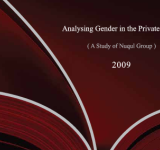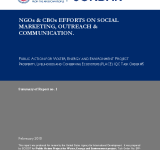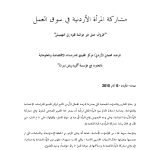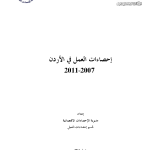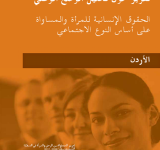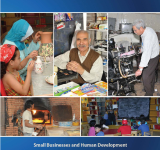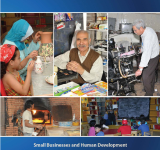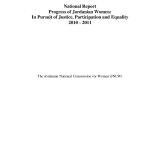جاءت هذه الدراسة لغايات التعرف إلى واقع إدماج النوع الاجتماعي في القطاعين العام والخاص. وتعد هذه الدراسة الاولى في مجال تحليل واقع ادماج النوع الاجتماعي في القطاع الخاص ممثل بالادارة الاقليمية لمجموعة شركات نقل في المملكة الاردنية الهاشمية بهدف تحليل أبعاد إدماج منظور النوع الاجتماعي من خلال محور الموارد البشرية و المحور المؤسسي. ولتحقيق ذلك جمعت الدراسة بين المنهجين الكمي والنوعي بحيث استخدم منهج المسح الاجتماعي لرصد البيانات الكمية وتحليلها من خلال اجراء مسح شامل لكافة العاملين في الادارة القليمية للمجموعة والبالغ عددهم 110 عامل وعاملة. وتم اعتماد الاستبانة كأداة لجمع المعلومات من المبحوثين بالاضافة الى البيانات الواردة في السجلات الرسمية للمؤسسة. أما فيما يتعلق بالتحليل على المستوى المؤسسي;; فقد تم استخدام المنهج النوعي من خلال إجراء المقابلات المعمقة مع عدد من العاملين والعاملات والذين تم اختيارهم باستخدام أسلوب العينة القصدية الطبقية .
private sector
The report is based on the findings of the survey that was designed to review NGO/CBO experience in communication/outreach and assess the capability of individual staff in the relevant NGOS and CBOs. The primary goal of the project is to institutionalize social marketing practices in NGOs and CBOs;; because organizations in the forefront of development depend on their ability to reach target groups and remove barriers to change. The research was conducted as part of the Public Action in Water;; Energy;; and Environmental Project to initiate and establish clear and identifiable behavioral changes amongst the Jordanian public and decision-makers;; to lead to increased efficiency in the use of water and energy;; and to improve solid waste handling practices. The main findings of the research identify sources of funds and grants of the NGOs;; their major activities and partnerships. The report also suggests training for successful fundraising;; social marketing and media campaigns for the NGOs and continued surveys and interviews of the NGOs.
يأتي اصدار هذا التقرير في سياق التقارير والنشرات الصحفية التي يصدرها المرصد العمالي الاردني التابع لمركز الفينيق. وأصدر هذا التقرير الصحفي بمناسبة احتفال العالم بيوم المرأة العالمي ليتناول واقع مشاركة المراة اقتصادياً;; وخاصة في سوق العمل. وللوقوف على ما تم انجازه حتى الان في مجال زيادة مشاركة المراة في الحياة الاقتصادية. وكما قدم التقرير توصيات لتذليل بعض العقبات التي تقف أمام المراة;; للاندماج أكثر في الحياة الاقتصادية وسوق العمل.
يقدم هذا التقرير مجموعة من المؤشرات على شكل أرقام ونسب مئوية للقوى العاملة وأبرز الخصائص التعليمية والنشاط الاقتصادي والفئات العمرية والحالة العملية والمهنية ومستوى الرواتب والأجور النقدية المدفوعة وحجم التوظيف وغيرها. وكما يتضمن التقرير مجموعة من الجداول التفصيلية والأشكال البيانية لأهم المؤشرات للفترة الزمنية 2007-2011 وهذا بالاضافة الى كيفية احتساب أهم المؤشرات حسب تعاريف منظمة العمل الدولية.
وﻳﻜﻤﻦ اﻟهدف اﻟﻌﺎم ﻣﻦ اﻟﺘﻘﺮﻳﺮ اﻟﻮﻃﻨﻲ ﻓﻲ اﻟﻘﻴﺎم ﺑﺘﺤﻠﻴﻞ وﺿﻊ ﺣﻘﻮق اﻟﻤﺮأة واﻟﻤﺴﺎواة ﻋﻠﻰ أﺳﺎس اﻟﻨﻮع ﺑﺎﻟﺘﺮﻛﻴﺰ ﻋﻠﻰ اﻹﺻﻼﺣﺎت اﻟﻘﺎﻧﻮﻧﻴﺔ واﻟﻤﺸﺎرﻛﺔ ﻓﻲ ﺻﻨﻊ اﻟﻘﺮار ﻓﻲ اﻟﻤﺠﺎﻟﻴﻦ اﻟﻌﺎم واﻟﺨﺎص واﻟﻌﻨﻒ اﻟﻤﺮﺗﻜﺐ ﻋﻠﻰ أﺳﺎس
The report highlights the essential role played by micro;; small and medium enterprises in the promotion of human development in the country;; and through four main pillars;; namely economic growth;; that is inclusive and pro-poor;; social progress;; participation;; empowerment throw micro finance;; and environmental sustainability. The report consists of eight chapters dealing with: the concept of human development through small and medium enterprises;; human development in Jordan;; economic growth;; social progress;; empowerment;; the role of microfinance to empower less advantaged groups;; and a chapter on sustainable development.
This report explores the role of Small and Medium-Enterprises (SME);; as an agent for sustainable human development in Jordan. It analyzes SMEs and their contribution to human development using fours key central pillars of human development;; namely: economic growth that is equitable and pro-poor;; social progress;; participation and empowerment through micro finance;; and environmental sustainability. The report analyses the link between SMEs and empowerment or lack thereof;; with a specific focus on the two issues of employment;; as a tool for empowerment;; and the capacity of SMEs to enhance the position of women within the workforce and home. The report findings were based on extensive research;; a survey of 1;;500 firms and focus groups discussions conducted across the governorates of Jordan. The report proposed general recommendations in terms of institutional coordination;; exports;; cluster groups;; quality standard;; government monitoring;; tax law;; local development;; youth empowerment and the increase of minimum wage.
This national report is designed to trace the progress of women in various fields;; monitoring achievements;; and highlighting gaps and failures;; as well as analyzing indicators;; recommending measures;; and measuring levels of achievements in the implementation of plans and strategies. The main themes were selected according to national priorities dictated by each stage: Legal Protection for Women's Right to Access Justice;; Participation;; the Economic Empowerment of Jordanian Women;; Equality;; Citizenship and Decision-Making in Public Life. The conclusions of this report confirm that a much smaller effort was exerted at the level of providing information;; data and the provision of services in the area of providing justice and facilitating ways of achieving it. The lack of knowledge about available services among women;; whether provided by civil society organizations or government institutions;; affects women's ability to access justice negatively. Regarding the economic participation the Policies and plans that targeted empowering women economically show that the result of these policies was weak and limited. Difficulty of women’s access to job opportunities in the private sector and inequitable pay between the sexes;; lack of supporting services to working women;; including childcare Facilities;; poor matching between education outputs and skills required in the labor market and the traditional social standards that contribute to directing females towards certain professions. The report proposed general recommendations and directions that include quick solutions to deal with the main highlighted challenges.
